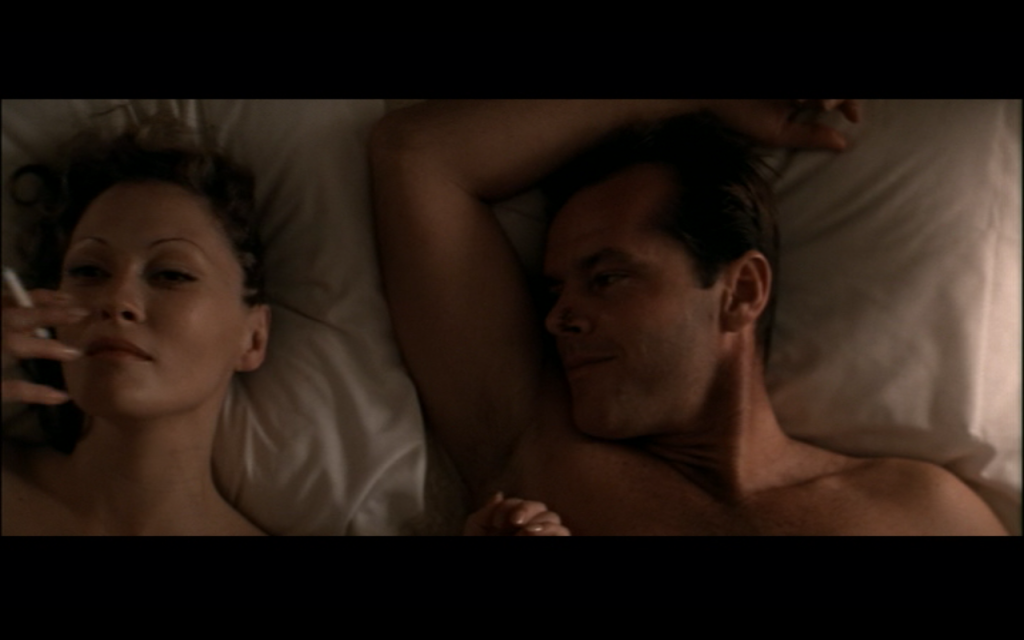Discussing whether flashbacks are a good idea with writers is about as easy as trying to choose your favorite Star Wars movie. There really isn’t one definitive answer. We just want to say that avoiding flashbacks more often than not is probably a good rule of thumb for all screenwriters. Here’s why:

How much better is it that Jake tells Evelyn about what it was like to work in Chinatown rather than cutting away from this moment to see it? Photo courtesy: Paramount Pictures
No. 1 — Flashbacks take you out of the main plot
Your audience likes your character and your storyline, so why do you want to yank them from it by taking them to another time? I know, I know, it’s because you need to explain something. But you see, that right there is the reason why you shouldn’t be doing it. Writers aren’t supposed to “explain” things in scripts. You do have to give the audience information, but it needs to come through plot and character — and always if you can, through conflict. It’s better to see your character react to the information the writer wants to get out there in the here and now rather than have it explained in flashback.
We never see what happened before Chief Brody came to Amity Island. Photo courtesy: Universal Pictures
No. 2 – Flashbacks prevent you from moving story forward in another creative way
Learning about some terrible deed or deep back story is an excellent way for us to get closer to your character and understand him or her in a way that illuminates the plot. But if you let this conflict play out in the present with those who surround your character, it will undoubtedly make for better conflict. Let’s look at Jaws for example. Do we need to see what happened to Chief Brody in New York City that made him abandon his job and move to the island? Why is he afraid of the water? These are questions that could be answered in flashback, but instead the writer chose to advance the plot around these questions, giving the audience a deeper experience by leaving some things unsaid.
No. 3 – Flashbacks give everyone an amateur vibe
It’s a tough one to hear, but flashbacks are often used by new writers because it is an easy way to explain something that happened in the past. And, that’s not to say that they can’t be used sometimes, but more often than not, you can find a work around. Challenge yourself to see how you can get this information out without going back in time. It could come out in dialog. Your character could find an old object – like a necklace or a ring – and speak to someone else in the present about how he or she is feeling. Or better yet, another character notices how upset your protagonist is when he or she picks up the ring and then pushes for answers. This is how you get conflict – in the here and now – into a scene and also give us the information that would come out in the flashback. That said, if you want to do a campy horror mashup, like Wayne’s World, then maybe a flashback could bring a comedic a vibe to your film.
The audience never sees the fight John McClane gets into with his wife prior to her moving to L.A. Instead, that backstory is incorporated into the current plot. Photo courtesy: Twentieth Century Fox
No. 4 — Flashbacks take the best moments away from your actors
What’s worse, seeing the terrible childhood and abuse on screen or seeing an actor relive those moments with years of anger, frustration and sadness on his or her face? Why take this moment of remembrance and have your director cast it with another actor who isn’t even playing the role of the protagonist? You’re robbing your cast of being able to express this moment again, in the here and now.
These are just a few reasons why challenging yourself to avoid flashbacks could make your scenes more exciting, your dialog more interesting and your script more appealing to cast. But we’d love to hear your thoughts, too. Why do you think avoiding flashbacks is a good idea?